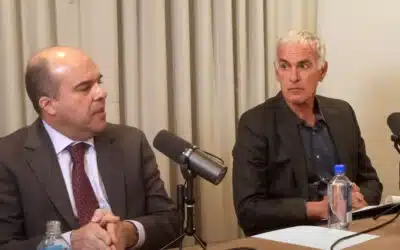So Dr. Evan Siegel, from Brooklyn, New York (who holds a PhD in Mathematics from the City University of New York Graduate Center and has an impressive resume), writes in his blog “Iran Rises” (complete with a green banner background, presumably in the by now familiar expression of solidarity with the party of Mir Hossein Mousavi) posted a response to my article “The Case of the ‘Fatwa’ to Rig Iran’s Election“. I learned this because he left a comment on my article saying “there might be hope” for me yet, and providing the link. So I read Evan’s response. He mostly employs the strawman argument, countering arguments I didn’t make while failing to address points I actually wrote about.
He begins by saying that my article belongs “to a genre of articles alleging that the resistance to Ahmadinejad is a CIA plot”. This is curious, since I didn’t write about the CIA at all in the article. The subject of the CIA did come up–once, in a quote from Paul Craig Roberts, who observed that announcing one party in an election as the winner before the results are in “is classic CIA destabilization designed to discredit a contrary outcome. It forces an early declaration of the vote.” That’s the only place where “CIA” appears in the entire article.
He also says the “genre” to which my article belongs is one that alleges “that the millions of young people pouring into the streets resisting him were at best privileged youths angry at the mullahs for spoiling their fun and at worst supporters of neo-liberalism against the progressive/populist Ahmadinejad”. I’ve written not on iota about Mousavi’s supporters being “privileged youths” having their “fun” spoiled or being “supporters of neo-liberalism”. Evan offers no quotes from me to show otherwise.
It’s instructive that instead of discussing my actual article and the specific things I actually wrote in it, he labels it as part of a “genre” lumps it in with whatever other articles he has in mind. So from the get-go, Evan finds it necessary to employ a strawman argument in order to make his point.
Evan added that most authors in this genre don’t know Persian. The “genre” aside, the generalization about language ability does apply to me. I don’t know Persian. But Evan fails to explain what significance he thinks this holds, and draws no conclusions from it (he does make a point about it later on, which we’ll come to, but it’s a further fallacy).
Next, Evan creates a logical syllogism, suggesting it is my own logic: “Iran’s government is making trouble for America and America has poured millions of dollars into subverting it and a revolt breaks out which threatens Iran’s government. Therefore America is responsible for the revolt in Iran.” He then goes into a lengthy discussion of how “This argument breaks down”, which it’s unnecessary for me to get in to, since I’ve never employed the above logic or drawn that conclusion (At this point, I’m beginning to wonder whether Evan actually carefully read my article or not). It’s another strawman argument.
Skipping his response to his own further strawman argument (since it’s unnecessary to respond), Evan writes, “But now, let’s get to Hammond’s writings”. Yes, let’s (it’s about time this response to my article actually addressed something I actually wrote).
Evan begins by expressing his opinion, contrary to my own, that Iran’s presidential election was stolen. Okay, so we disagree. So what’s Evan’s evidence of a stolen election? He offers none, but just repeats the claim several times over.
He says, “The opposition had valid concerns over the elections.” I agree. Most of the concerns I have seen expressed, however, have since been reasonably addressed. Like the claim of more votes than registered voters for a particular area, for one example, among numerous others.
Evan writes, “The last presidential elections were won by Ahmadinejad after a suspicious last-minute surge snatched it away from the challenger, reformist cleric Hojjatoleslam Mehdi Karubi.” It’s correct that Ahmadinejad won the last election, in 2005. That it was “suspicious” is Evan’s own opinion, which he offers no evidence to support. Elsewhere, his facts are just incorrect. Ahmadinejad’s challenger in the 2005 run-off was not Mehdi Karroubi, but Akbar Hashemi Rafsanjani, who was also Ahamadinejad’s leading opponent in the primary.
Evan continues, apparently returning to the 2009 election, “The vote count was performed with super-human speed, after which Supreme Leader Ali Khamenei immediately declared his protege, Ahmanidnejad, the winner, flouting the Islamic Republic’s laws. None of this finds its way into Hammond’s essay.” For good reason. Evan offers nothing to support his assertion that the “count was performed with super-human speed”, and I simply disagree. The results were announced early, but this goes to the point I quoted Paul Craig Roberts as making, that Mousavi’s early declaration that he was the conclusive winner before the polls had even closed forced the early announcement.
Evan observes that my article — as the title suggests — focuses on the alleged “fatwa” in which Ayatollah Yazdi allegedly ordered the election to be rigged. The whole point of my lengthy article was to examine this claim and the sources for it, and to demonstrate that it’s a dubious and unverified one. Evan’s response to this is merely to reassert that the claim is a fact. “But it is now well-known that this fatwa had been issued”, he writes, ignoring the entire body of my article that examines the veracity of this claim and offering no further sources outside of the ones I showed to be dubious that would substantiate it.
Evan suggests the “obvious answer” to my question “if an ayatollah issued a ‘fatwa’ ordering the election to be rigged … why haven’t we heard about this elsewhere [outside of the sources I examined]?” is “BECAUSE YOU DON’T READ PERSIAN!” So, what, nobody at the New York Times, Washington Post, Los Angeles Times, CBS News, Fox, etc. reads Persian? No professional correspondents, including Iranians, for any of the mainstream corporate media in the United States reads Persian? The fact that Jeremy Hammond doesn’t know Persian hardly answers the question for why this claim wasn’t reported in the mainstream media. The assumption is, since the media in the U.S. is particularly biased against Ahmadinejad, if such a claim had even the slightest amoung of credibility, it would have been snatched up and propagated by them. It wasn’t. Why not? The question remains. Evan leaves it unanswered.
Evan resorts to fabricating quotes from me on a few occasions, such as writing that I called the fatwa “mysterious” (the adjective does not appear in my article — but fair enough, Evan’s insertion could well apply). He says I took the time “to mutter, ‘Just as I suspected!'” after going over certain details in my article. Again, the words do not appear in my article, and the quote is Evan’s own invention.
Evan next addresses facts I wrote about the website Tehran Bureau that propagated the claim about the “fatwa”. It’s unnecessary to go into the factual details, since Evan doesn’t address them. Instead, he sarcastically remarks things like “Boy, those spooks don’t miss a trick” and “Fiendishly clever!”, without actually making any attempt whatsoever to explain the questions I raised or address the facts I wrote about.
He suggests that my raising the point that the claim of the “fatwa” at Tehran Bureau was unattributed and unsourced is evidence that I have a “tin ear for Iranian reality”. Evan apparently has a tin ear for credible journalism practices. And I disagree that to expect claims to be attributed and sourced before we should be expected to accept them as fact is to demonstrate ignorance of Iran.
Evan says I spent “several paragraphs” of my article “insinuating that Niknejad is a spy”. This is not something I wrote, but Evan’s own interpretation. He provides an example for how he arrives at this conclusion. I quoted the ostensible owner of Tehran Bureau (it’s in fact owned by someone else, who registered the domain name nearly a year before the purported owner says she launched the site) as saying, “If Iranians are suspicious of journalists, it’s partly because our reporting jobs can seem like the perfect cover to gather intelligence”. I commented “As they often are.” Which is true. There is no “insinuating” here. I’m simply stating the fact that journalism is often a cover for intelligence activities. That’s a simple fact, amply documented elsewhere. His other examples of where I “twist her words” follow similar suit, requiring no further response.
Evan says my article is “paranoid” because I named an example of an organization working for women’s rights in Iran that has received grants from the National Endowment for Democracy (NED). Why observation of this fact makes me “paranoid”, Evan offers no explanation of. He says this group “had no relationship with what was going on in the streets”. I never said it did. Again, it’s a strawman.
Evan employs yet another strawman argument, saying my “reasoning would imply that any woman’s group … is ipso facto an agent of the Americans, since some woman’s group … has received money from the Americans.” I, of course, employ no such logic, explicitly or implicitly, in my article. Evan clearly thinks this is nonsense. I agree with him.
I wrote in my article that certain claims regarding the “fraudulent” nature of Iran’s election “can be traced to Tehran Bureau”. Evan responds, “Well, yeah. Tehran Bureau and about ten thousand other blogs.” He links to four of them. They are all Persian sites. Obviously, I realize certain claims made by Tehran Bureau originated in Iran — I made that point strongly in my article (but Evan neglects to relate that information to his readers). My point is that, in the English-speaking Western media, for the American audience following events there, Tehran Bureau was often the original source, as best I could tell, for some of the claims. Examples include the “fatwa”, the straight line graph, the attack on Mousavi’s headquarters, etc. I made the point in my article that Tehran Bureau was simply copying and pasting some of this information from Persian sources, but, again, Evan chooses to ignore that fact so he can suggest that I had suggested that Tehran Bureau was the original source for some of these claims. In fact, I noted repeatedly and strongly emphasized otherwise.
To reiterate, my point was that for we Americans, in the media and blogs that are popular here, in the English language, many of the claims could be traced to Tehran Bureau, which, I observed, in turn had copied and pasted information from Iran, including Persian sources, including using at least one key source that was a member of Mousavi’s campaign. I’ll chalk this one up to Evan misunderstanding my point, rather than dishonesty, such as the intellectual dishonesty of his numerous strawman arguments.
One of Tehran Bureau’s key sources was actually a member of Mousavi’s election campaign. Evan also ignores that point (along with many other relevant points I made about the credibility of Tehran Bureau as a source for information on the election), and doesn’t address it at all.
Evan notes that I noted that another website I examined is hosted by GoDaddy. He then says, “He neglects to note that GoDaddy.com, Inc. is (excuse me) the classic low-budget host. Hardly the recipient of millions of dollars in government aid.” His suggestion is that I had said GoDaddy was the recipient of government aid. Again, this is yet another of Evan’s strawman arguments. I neither said, suggested, nor insinuated any such thing.
Evan closes by first saying “let us agree with Hammond that the American government would not be doing its job if it were not seeking leaders in the Iranian opposition to groom.” I don’t know where Evan gets the idea that I think it is the “job” of the U.S. government to interfere in the domestic politics of other nations, including Iran. I couldn’t disagree more strongly. Perhaps he means to say that he agrees that we can expect that the U.S. government will interfere in Iran’s affairs. If so, yes, we can agree.
And he ends by writing, “Hammond’s reckless and obsessive attempts to smear honest and patriotic Iranians who are appalled by the Ahmadinejad regime and the way it stole the elections in plain view as American agents puts them in danger.” Yet again, Evan finds it necessary to resort to a complete strawman argument. Moreover, he again asserts that the election was stolen, without evidence. Apparently, simply questioning the claim that the election was stolen is to be “reckless and obsessive” and “to smear honest and patriotic Iranians”. I simply disagree. I think it’s responsible to question these claims, and reasonable to expect actual, tangible evidence to support them; and I don’t think acting reasonably in any way serves to “smear” anyone. But Evan is, of course, entitled to his opinion, however misguided, however dependent upon unverified claims and fallacious logic it might be.
If Evan has any evidence to support the claim of the “fatwa”, I’d be delighted if he were to share it with us. I wish him well with his “Iran Rises” blog dedicated, apparently, to supporting what he calls there the “Green Movement”.


